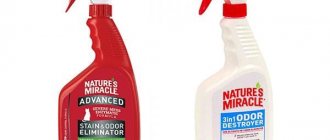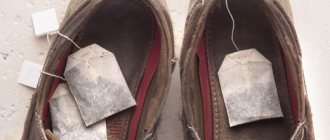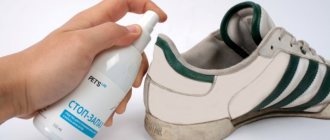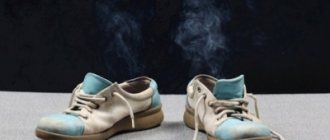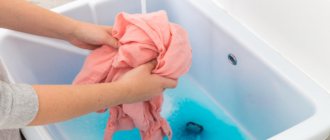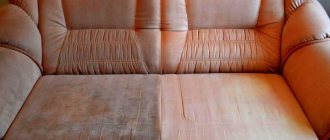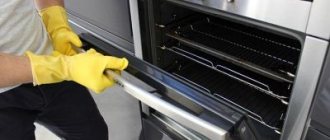If your favorite sneakers or boots have an unpleasant odor, don’t immediately throw them in the trash. This is not such a serious problem that it needs to be solved with drastic methods, but it is unlikely that this trouble will be left unattended. The smell of sweat in shoes can not only cause discomfort, but also put you in an awkward position in front of others if you have to take off your shoes at a party or at a doctor’s appointment.
Causes of unpleasant amber
Before you think about how to quickly remove odor from shoes, you need to understand the reasons for its occurrence. The following factors can influence the appearance of bacteria:
- increased sweating;
- fungus;
- circulatory disorders in blood vessels;
- violation of personal hygiene rules;
- lack of preventive shoe care;
- wearing hosiery made of synthetic materials;
- low quality artificial leather shoes;
- active lifestyle;
- wearing shoes that don't fit;
- storage in a room with high humidity.
A proven remedy for sweating feet is Teymurov’s paste. Apply the product before bed on clean, dry feet, between the toes, put on socks and lie down. The course of application is seven days; if necessary, you can repeat the procedure after a couple of months.
Foot baths
A good remedy for foot odor would be baths with the addition of herbs, oils and salt. You can use tea tree oil, eucalyptus or peppermint oil, or ready-made foot salts.
- Add one type of preparation, salt and a cup of vinegar to warm water and soak your feet in it for a quarter of an hour.
- Such procedures should be carried out regularly 1-2 times a week.
- The problem of excessive sweating of the feet can also be combated by soaking them in a decoction of sage, oak bark, walnut or lavender.
How to get rid of odor from shoes: a review of available products
To cope with the “stinking problem”, products that can be found in the kitchen or purchased at a store or pharmacy will help. If you can’t remove the odor from sweat from your shoes the first time, repeat the procedure. And don’t forget to ventilate your shoes well after treatment.
Products from the kitchen
There are a number of products available in the kitchen that can help remove odor from shoes. And their bactericidal properties will also destroy bacteria and microbes. Here are the six most used remedies.
- Vodka. Pour vodka into boots, shoes, put on socks, and walk around until the alcohol evaporates. Then place the pair of shoes on the balcony to air out. There will be no trace left of the stinking “aroma”.
- Green tea or coffee. Place a used tea bag under the insole or sprinkle some leaves into each shoe. Tea neutralizes bad odors and has an antibacterial effect. Scattered coffee granules will give your shoes a pleasant aroma.
- Vinegar. Moisten cotton wool with a 9% vinegar solution, wipe the boots, then put them out in the fresh air to air. The solution will remove the unpleasant odor and kill harmful bacteria and fungus.
- Salt or soda. Pour table salt into your sneakers and leave for one night. This universal product will absorb moisture and nasty odors. You can do the same thing with baking soda, but use it for light-colored shoes. Remove excess powder from the sneakers using a vacuum cleaner.
- Corn starch. Sprinkle it under your shoe insoles overnight. It absorbs moisture well and removes old miasma of sweat.
- Citrus peels. Place fresh orange and lemon peels inside your shoes. Overnight, the shoes will be saturated with them and will smell fresh.
Cat litter will also cope with the unpleasant odor from sneakers, because its main function is to fight odors. In addition, if you pour filler granules into a sock and put it inside wet sneakers, then in the morning they will be completely dry.
Pharmacy drugs
Check your home first aid kit and you will find at least one of these remedies. And if not, then you can buy them at the pharmacy for literally pennies. The ten pharmaceutical products listed below have the necessary effect.
- Hydrogen peroxide. Moisten a cotton pad with a 3% solution and wipe the inside of the sneakers. Then dry them well. Peroxide is suitable for treating sneakers to prevent the development of fungus. The solution may lighten the dark surface of the shoes, so only use it on light-colored shoes!
- Potassium permanganate. Dissolve two manganese crystals in 150 ml of warm water, wet the disc, wipe the inside of the shoe, and dry.
- Talc. Sprinkle the inside of your shoes with talcum powder and leave overnight. Vacuum the next morning - the talc will absorb moisture.
- Activated carbon. Place a few tablets in your boots at night. The sorbent will absorb bad aroma and moisture. Keep in mind that charcoal may leave dark stains when processed - use it for black shoes.
- Tea tree oil. Soak a cotton pad in ether and wipe the inside of the sneakers. Ether vapors will help cope with ingrained sweat odor and disinfect insoles and fabric.
- Ammonia. Dilute one tablespoon of ammonia in a glass of water and wipe the contaminated areas on the shoes with it.
- "Formidron". Apply the product to a cotton pad and wipe the inside walls of the shoes. Then wrap the shoes in cellophane and leave for 12 hours. Formidron will not only get rid of the stinking amber, but will also serve as a preventive measure for foot fungus. Be careful - it contains formaldehyde, so use gloves when handling.
- Alum. Place white powder crystals under the lining of your shoes. In the morning, remove excess with a napkin. The remaining powder under the lining will act as a deodorant. This is a great way to get rid of odor in sneakers.
- Lavender oil. Drop lavender onto a sponge and wipe the inside of your shoes. This is an antibacterial attack, since the ether not only has a pleasant aroma, but also kills microorganisms and mold.
- "Chlorhexidine." Take a solution of 1% concentration and moisten a cotton pad with it. Wipe the inside of all shoes thoroughly. Place the purified pair in a bag and leave for several hours. Then dry thoroughly in fresh air. Chlorhexidine is a powerful odorless and colorless antiseptic that kills various dermatitis and bacteria. Absolutely safe in contact with skin.
Regular foot baths can reduce excessive sweating of the feet. The main ingredients can be sea salt, soda, green tea, citric acid, oak bark.
Professional "helpers"
If you do not want to experiment with traditional methods, then store-bought products will help solve the problem. They contain tannins and antiseptics, which reduce sweating and stop the proliferation of harmful microorganisms. But you can get rid of the unpleasant odor from shoes if you apply them to already cleaned sneakers or shoes. According to their type and method of influence, they are divided into:
- deodorants;
- ointments, creams;
- pills;
- pencils (sticks);
- insoles.
Deodorants are easy to use and suitable for daily use. The shoe odor remover should be sprayed onto the clean skin of the feet and wait until it dries. They come in four types.
- Antiperspirants. They block the work of the sebaceous glands, so they cannot be used constantly.
- Normalizing deodorants. Reduces the activity of the sebaceous glands, causing the feet to sweat less.
- Therapeutic deodorants. They do not fight the smell, but the cause of its occurrence, bacteria.
- Sprayers for shoes. The product in the form of an aerosol removes odor using various fragrances. You need to spray inside the boots and wait for it to dry. The validity period is several days.
Other store “helpers” also effectively affect the causes of odors. Here are four of the most well-known remedies.
- Ointment. It is considered the most effective assistant in the fight against sweating. It is quickly absorbed and has a longer effect, unlike a spray. Pleasantly softens and moisturizes the skin of the feet, suitable for daily use.
- Pills. Leave in shoes overnight. They have a good effect and excellent reviews, but are not cheap.
- Sticks. Available in the form of a thick pencil, they remove bad odors, but they are inconvenient to use. One careless movement during processing, and the special rod will break.
- Insoles. They come with a base of silica gel or activated carbon. Helps keep shoes fresh for a long time.
Alternative Methods
All means are good for removing unpleasant odors from your favorite boots. But it’s not always possible to wash or treat shoes to remove odor, and you don’t want to see mold and mildew appearing on your shoes. Then alternative methods come to the rescue. Here are three of the most popular.
- Low temperature. Wrap the shoes in a plastic bag and put them in the freezer for several hours. In winter, in order not to occupy the freezer, a couple can be placed on the balcony. This method will help eliminate odor in shoes with fur. The cold will kill all microorganisms, and therefore the winter pair will be as good as new.
- Wash. If the material allows, then wash the sneakers on a delicate cycle in the machine. Then dry them well, since the favorite environment of bacteria is moisture.
- Steam generator. Turn on the device and spray the inner walls of the shoes and insoles with a stream of hot air.
The freezing method is not suitable for patent leather. It can crack from low temperatures.
Where does this smell come from?
Eliminate the cause and the effect disappears: this principle also works when a noticeable scent appears on shoes. If your shoes stink from the inside, it depends on several factors:
- seasonality of wearing - in hot weather the topic of unpleasant shoe odor is most relevant;
- shoe configuration - closed shoes are not ventilated enough, the smell of summer closed shoes is more intense;
- related to the previous point - increased sweating of the feet of the shoe owner: long walking, synthetic socks and tights or hot weather force overloaded muscle tissue to cool intensively, sweat is released, which is absorbed by the inner layers of the shoe;
- The branding of sneakers or shoes does little to prevent the appearance of “odors”: no matter how branded the sneakers are, the feet still sweat in them, and in combination with serious physical activity, sweating increases.
A nasty smell from shoes is not only an odor and a challenge even for not the most sensitive noses, it is a signal of the emergence of an environment favorable for the growth of bacteria; a destroyed microenvironment often becomes a source of fungal diseases. Do your shoes smell? We urgently need to save our own sense of smell and the smell of people around us, as well as the health of our feet.
Based on the causes of occurrence, there are two ways to solve the problem of shoe stench: regular foot hygiene and timely cleaning of shoes . We won’t write about how to wash your feet and change your socks every time, but we will dwell in detail on the second point, dedicated to cleaning the inside of shoes.
If the shoes are “marked” by the cat
The cause of the pungent odor can be the tricks of your beloved pet. The biggest catch is that the smell of cat urine is very persistent and difficult to remove; water does not affect the uric acid crystals. What can I do to prevent my shoes from smelling in this case? Treatment must begin immediately and be carried out very carefully. If you leave even a drop of sticky urea, the slightest wetting and bad aroma will return again. The algorithm of actions includes five steps.
- Inspection. Throw away your insoles; most of the urine accumulates on them.
- Wash. If the shoes are made of fabric materials, then wash them with glycerin soap.
- Wiping. Genuine leather does not tolerate washing, so treat it with a solution of potassium permanganate. Dilute several manganese crystals per liter of water, wipe the boots well, then dry and ventilate.
- Drying. If your urine smells old, use acetic acid. Mix water and vinegar in equal proportions, wipe the shoes and cover the wet areas with baking soda. When dry, remove the residue and leave the boots to dry.
- Treatment. At the end of the procedure, treat your shoes with a special animal repellent to prevent the situation from happening again.
Features of processing different materials
There are many ways to get rid of odor in shoes, but different materials have their own nuances. Be sure to choose a method that is suitable for your couple.
Leather. The material does not tolerate moisture and acid treatment. If you want to wash your boots, you need to dry them well in a draft or open air. The skin should not be heated, otherwise it will wrinkle and lose its shape.
Leatherette. An unpredictable material that can deteriorate from moisture, alkalis and chemicals. Before cleaning such shoes, test the selected product on a small area.
Suede . Such shoes cannot be washed or treated with wet methods. To refresh suede shoes and boots, use activated carbon, baking soda and citrus peels.
Textile. It is unpretentious and can withstand any type of processing. The easiest way to get rid of the smell in this case is washing in a machine.
Rubber. Boots and galoshes easily tolerate wet and dry cleaning methods. After washing, you need to make sure that the shoes dry inside: rubber does not allow air to pass through. If the insulation is removed, it must be washed separately.
Fur. A capricious material that requires regular drying. Do not use water, alcohol or acids in fur care. Dry processing methods, aromatic oils and sprays are suitable.
Mold control
Storing shoes in a damp area can lead to mold growth. But don’t rush to throw away a pair, all is not lost. A three-step algorithm of actions will help.
- Washing with soap. First, wash your boots in warm soapy water and wipe the inside with vinegar to disinfect.
- Wiping from the inside. Now mix ammonia and vodka in equal proportions and thoroughly wipe the inside of the shoes.
- Drying. Leave the shoes to dry for a couple of days. Never wear uncleaned shoes; moldy fungi are dangerous to the skin.
During the rainy season, a special device - an electric dryer - will quickly help dry your shoes. The built-in ionizer and ultraviolet treatment kill bacteria and fungus. If it is not possible to purchase a dryer, stuff old newspapers into your boots - they will absorb excess moisture.
Removing a specific spirit in new shoes
When making your next purchase in a store or market, you should not only look closely, but also smell. If you notice that the shoes emit an incomprehensible, pungent aroma, it is better to refuse the purchase. There can be several reasons for the stink: improper packaging, low-quality glue or manufacturing material.
If the purchase is still completed, and the unpleasant heavy spirit has not disappeared, then you can try to quickly eliminate it on your own.
- Unfasten the zippers, unlace the laces, and air the product.
- Place a green tea bag under the insoles.
- Wipe the insides with vinegar.
- Dry in an open space.
Preventive measures
Regardless of price and material, shoes require regular care. Without it, any folk remedies and deodorants will be useless. Implement six useful care rules into your life, and your favorite shoes will last you a very long time.
- Spare shoes. Have several pairs of shoes per season so that you can wash and dry your shoes.
- Replacement pair. Have replacement shoes at work. Your feet shouldn't be sore in your boots all day if you work in a warm room.
- Constant care. Take care of your shoes regularly, if necessary, wash them in soapy water and clean them with brushes. And wash sneakers and sneakers in the machine at low temperature.
- Storage. Make sure that shoes are placed in places with good ventilation. Don't put wet boots in the closet overnight.
- Insoles. Buy insoles filled with activated carbon; they absorb sweat and odor well. Or change your synthetic insoles at least once a month.
- Hygiene. Don’t forget about the rules of personal hygiene; failure to comply with them can result not only in a sloppy appearance and an unpleasant odor, but also in various diseases.
Video on the topic
In rainy weather, treat your boots with special water-repellent agents. Boots and shoes made of suede especially need such protection. Use deodorants, they will help remove unpleasant odors from shoes and kill bacteria.
Additional recommendations
After the shoes have been cleaned and the unpleasant odor has been eliminated, it is important to keep the shoes clean and prevent the reappearance of “odors”:
- After wearing, leave the shoes open: the tops of the boots and the lacing of the shoes should open the inner surface as much as possible so that it has time to ventilate and dry before putting it on.
- It is recommended to have at least two pairs of shoes, which can be alternated every other day: the shoes will have time to “rest” and air out.
- Worn, uncleaned shoes should not be put into boxes for long-term storage: dirt should be removed and allowed to air out.
- A favorite way for some men is to kill two birds with one stone by stuffing their socks into their sneakers immediately after wearing them: a recipe for odor and creating an unventilated environment for germs to breed.
- And socks: it’s better if they are made from natural materials: synthetics in any form disrupt natural ventilation, increase sweating and give rise to a pungent odor.
Clean outside and inside men's boots
How to wash winter boots, combat boots, boots or ankle boots can be found out when purchasing these shoes in a store. Even professional-quality shoes require proper and regular care: regular cleaning and care of both the outer surface of shoes, boots, slippers and sports sneakers, as well as the inner surface, will extend the life of the shoes and save money, providing a healthy and beneficial microclimate for the feet.
